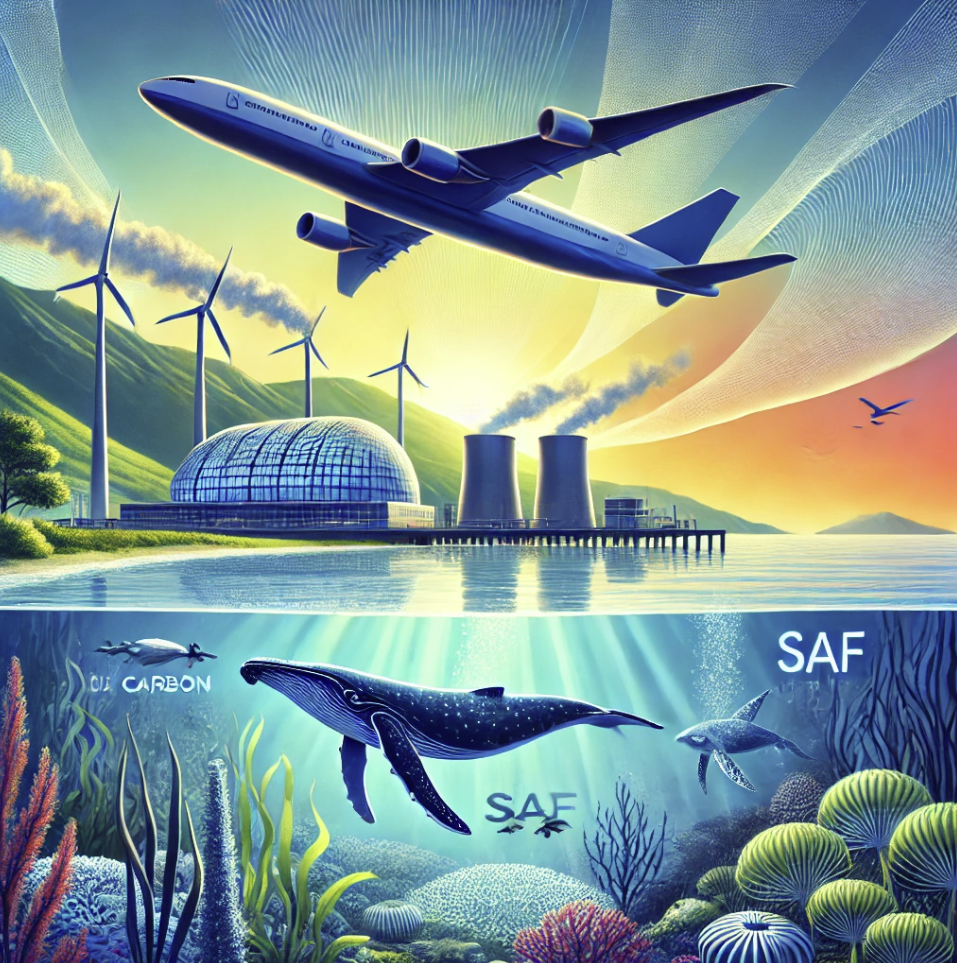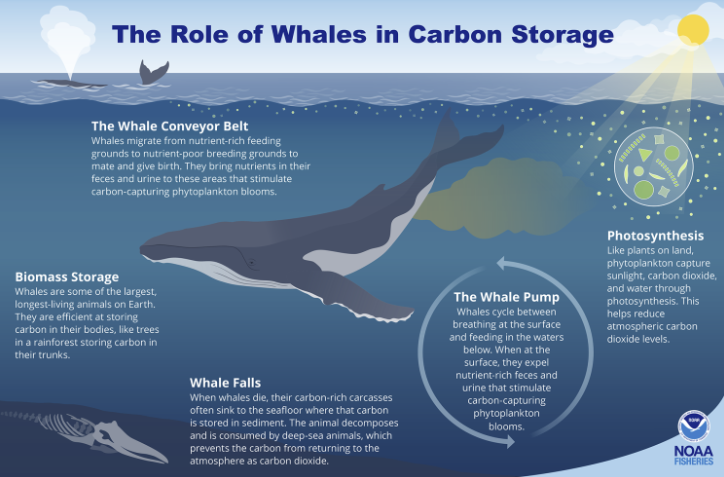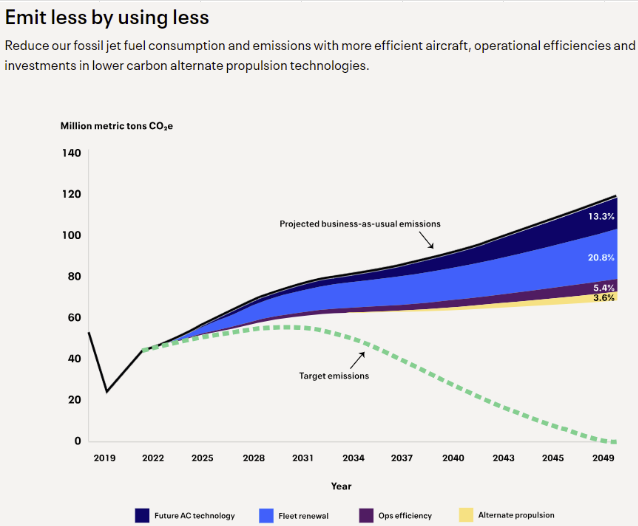A Thought Experiment about Sustainable Fuels
In the study of the philosophy of transactionalism, we have been discussing in our climate impact group the use of bunker fuels and how emissions over international waters are excluded from a country's nationally determined contributions and aviation left out of the Paris Agreement.
In a world where air travel is indispensable yet environmentally taxing, finding sustainable ways to offset flight emissions is crucial. Traditional carbon offset methods like planting trees often lack permanence and face environmental threats.
An innovative solution involves leveraging whales' carbon sequestration potential, offering a unique and effective means to offset flight emissions. This blog explores how nature-based carbon credits can be integrated into airline sustainability strategies.

The Carbon Sequestration Potential of Whales
Whales are not just the gentle giants of the sea but also powerful carbon sinks. Through their life processes, whales contribute to carbon sequestration in multiple ways:
Biomass Accumulation: As whales grow, they accumulate large amounts of carbon in their bodies. Their bodies sink to the ocean floor when they die, sequestering carbon for centuries.
Nutrient Cycling: Whales facilitate the growth of phytoplankton through nutrient cycling. Phytoplankton absorbs carbon dioxide during photosynthesis, significantly contributing to carbon sequestration.
Blue Carbon Ecosystems: Whales support the health of blue carbon ecosystems through photosynthesis, such as seagrass beds and mangroves, which are vital for carbon storage.

Image Credit: NATIONAL OCEANIC AND ATMOSPHERIC ADMINISTRATION | U.S. DEPARTMENT OF COMMERCE
Addressing Airline Emissions with Whale-Based Carbon Credits
Despite the aviation industry's efforts to reduce its carbon footprint, the current offset systems are often inadequate. They lack transparency, measurable impact, and long-term viability. Integrating whale-based carbon credits into these systems could provide a more effective solution.
Measurable Impact: Unlike some offset projects, the carbon sequestration by whales can be quantified and monitored.
Long-Term Storage: Carbon sequestered by whales is stored in the ocean for long periods, offering a more permanent solution than terrestrial offsets.
Economic Incentives: Assigning monetary value to whale conservation through carbon credits can motivate further protection efforts and ensure their populations thrive.
Airline Sustainability Strategies Review
Fred Overmars and Trisha Tyler reviewed three major airlines' sustainability strategies and carbon emissions data: Air New Zealand, United Airlines, and Delta Airlines.
Air New Zealand
Gross Global Scope 1 Emissions: 2,839,358 tonnes (2023)
Sustainability Targets:
Net zero emissions by 2050
10% of total fuel uplift will be Sustainable Aviation Fuel (SAF) by 2030.
Reduce carbon intensity by 28.9% by 2030 (from a 2019 baseline).
Key Initiatives:
Transition to electric vehicles for ground operations (87% electric).
Waste management aims to divert 65% of solid waste from landfills by 2023.
R&D funding for SAF production feasibility studies in New Zealand.
United Airlines
Gross Global Scope 1 Emissions: 38,138,662 tonnes (2023)
Sustainability Targets:
Net zero GHG emissions by 2050 without relying on voluntary carbon offsets.
Key Initiatives:
Eco-Skies Alliance for SAF purchase and collaboration.
Fleet renewal with more fuel-efficient aircraft.
Use of SAF at select locations (e.g., LAX, AMS, SFO, LHR)

Delta Airlines
Sustainability Data: Detailed data is here.
The Challenges of Current Offset Systems
Traditional carbon offset methods face several challenges:
Fire Risks: Forests, a common offset choice, are susceptible to wildfires, which can release stored carbon into the atmosphere.
Permanence Issues: Ensuring long-term carbon sequestration in terrestrial systems is challenging due to changes in land use and environmental threats.
Transparency and Accountability: Many offset systems lack clear metrics and monitoring, making it difficult to verify their effectiveness.
Promoting Sustainable Air Travel
As global citizens, we must acknowledge the environmental impact of our travel decisions. While flying is essential for connecting with overseas friends and family, it has consequences. By leveraging whale-based carbon credits, we can mitigate these impacts more effectively.
Understand the Impact: Educate travellers about the environmental footprint of flying and the benefits of whale-based carbon sequestration.
Offset with Integrity: Provide transparent and verifiable offset options for whale conservation and carbon sequestration.
Benefit Society: Ensure offset projects offer broader environmental and economic benefits, promoting sustainability and conservation.
What does it mean for a whale to be a ‘legal person’?
Whales have been recognised as legal persons by traditional leaders of the Pacific after a landmark treaty was signed last month.
The treaty, or He Whakaputanga Moana, was signed in a ceremony attended by Tūheitia Potatau te Wherowhero VII, the Māori King, Tou Travel Ariki, the Kaumaiti Nui (president) of House of Ariki, and elders from Tonga, Tahiti, Hawai’i, and Rapanui.
Under the treaty, whales will be recognised as a legal entity with rights and legal standing if harmed; something advocates hope will help ensure their legal protection; but what if the Whales could now benefit from nature-based solutions for carbon credits.
Benefits of Whale-Based Carbon Credits
Long-Term Impact: Carbon sequestered by whales remains stored for centuries, offering a durable offset solution.
Measurable Results: Unlike traditional offsets, whale-based sequestration can be quantified and monitored.
Support for Marine Conservation: This approach promotes the conservation of marine ecosystems, benefiting biodiversity and ecological health.
Conclusion
Integrating whale-based carbon credits into airline sustainability strategies offers a promising solution for offsetting flight emissions. This innovative approach addresses the shortcomings of traditional offsets, provides long-term carbon storage, and supports marine conservation. By adopting this strategy, airlines can enhance their sustainability efforts and contribute to a healthier planet.
As we move towards a more sustainable future, let's embrace innovative solutions that align with integrity, honour, and justice. Flying with a clear conscience is possible; whales might be the key.
What are the questions we are asking ourselves about this?
How do we link airlines and whales' carbon through carbon sequestration with ignoring Indigenous rights? The whale is an ancestor, so Maori as ocean guardians to ensure they’re protected.
Given that Emissions from aviation are a significant contributor to climate change. Aeroplanes burn fossil fuel, which not only releases CO2 emissions but also has intense warming non-CO2 effects due to nitrogen oxides (NOx), vapour trails and cloud formation triggered by the altitude at which aircraft operate.
Emissions from aviation have been growing faster than any other mode of transport and have more than doubled between 1990 and 2019
Do we know what the impact is on whales and the drivers in the oceanic ecosystems of the effect of emissions?
The oceans absorb 90% of the sun's energy.
We know that ocean acidification is the evil twin of global warming and the oceans, so what is the impact of air travel and bunker fuels on whales?
It will be an incredible surprise. CO2eq was 420 parts per million when the ocean temperature was 2 degrees. In New Zealand, the impact has been 4 degrees more, so New Zealand is feeling a significant application of the effects of global warming. What is the impact on whales?
What if the future of whales and their personhood, and the future of airlines sustainably, before we get comfortable with this solution?
By embracing this innovative solution, airlines can offset their emissions more effectively and play a crucial role in marine conservation and climate change mitigation. Under the treaty, whales will be recognised as a legal entity with rights and legal standing if harmed, something advocates hope will help ensure their legal protection and where can the funding to protect them come from.
References
Alimentary Systems' Commitment to Ocean Conservation and Sustainable Aviation Fuel
At Alimentary Systems, we protect ocean environments by preventing sewage discharge into oceans. Our commitment extends to exploring pathways for creating sustainable aviation fuel (SAF). By integrating our efforts in ocean conservation with the development of SAF, we aim to provide comprehensive solutions for reducing aviation emissions and promoting environmental sustainability.